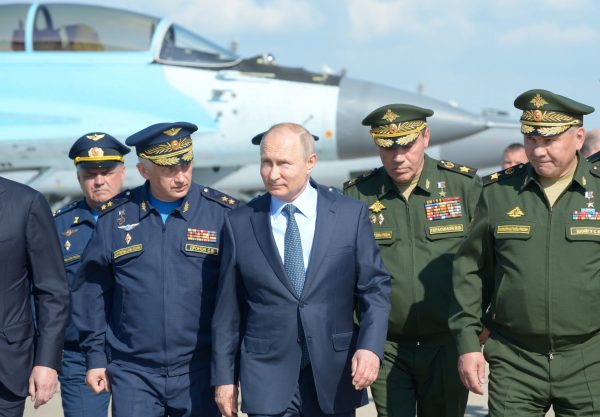Russian aerial incursions into South Korea’s Air Defence Identification Zone (ADIZ) — not to be confused with sovereign airspace — occur fairly often, usually near the southern island of Jeju. The South Korean air force usually responds by scrambling jets to escort Russian aircraft and by lodging a formal diplomatic complaint with Moscow.
But the Liancourt Rocks are within South Korea’s claimed sovereign airspace.
In the immediate aftermath of the incident, South Korean National Security Office Director Chung Eui-yong lodged a protest with the Secretary of the Security Council of Russia, Nikolai Patrushev. According to the Blue House, one Russian official attributed the intrusion to a technical error. The South Korean government claimed that Russia expressed regret over the incident, which Russia categorically denied.
The incident underscores several key points in the Kremlin’s policies toward the Korean Peninsula and Northeast Asia. The standoff between Moscow and Seoul has arisen despite the importance Russia places on smooth relations with Northeast Asian states for economic reasons and Russia’s quest for security in a tight geopolitical neighbourhood.
Russia must choose between being a military power or an economic player in its Northeast Asia policy. Moscow has largely opted for the latter, attempting to leverage influence through means such as the Eastern Economic Forum.
As part of this bid for economic influence, Russia also seeks to maintain a strong working relationship with Seoul. For Moscow — which has found a willing partner in South Korean President Moon Jae-in under his ‘New Northern Policy’ — economic collaboration with South Korea has strong security and commercial implications.
Maintaining equitable relations with Seoul is also critical to the success of Russia’s policy of diplomatic ‘equidistance’ between North Korea and South Korea — a cornerstone of Russia’s wider Northeast Asia strategy.
The diplomatic fallout over Russian intrusions into South Korean airspace is itself not likely to cause a major setback in Moscow–Seoul ties. They have survived much wider-ranging issues, such as the controversy over the Terminal High Altitude Area Defense (THAAD) system. Russia–South Korea relations are not burdened by historically-rooted animosities or current geopolitical complications, and Russian fears of upsetting Seoul have limited Moscow’s willingness to seek extensive defence cooperation with North Korea.
Still, there are two ways to interpret the wider reverberations of the standoff between Moscow and Seoul.
Former member of the Russian General Staff Igor Romanenko speculated that the incident was a deliberate demonstration of force. The incursion into South Korean airspace occurred during a joint air patrol with China. China has increasingly intimate defense ties with Russia and supports the Russian narrative that there was no deliberate violation.
China’s defence collaboration with Russia and its support in the aftermath of the incident could indicate that Russia feels more emboldened to engage in military demonstrations of power in Northeast Asia — as it often does in Europe. Russian analysts have likened the network of US allies in Northeast Asia to having NATO on the Russian eastern flank.
If, however, the incident was the result of an error, it underscores a wider Russian strategic need — the implementation of security multilateralism and enhanced communication in Northeast Asia.
Russia has bilateral agreements with various states on the prevention of dangerous military activities, including one with North Korea. But the incursion near the Liancourt Rocks highlights a need for a multilateral approach to security in Northeast Asia. The incursion also drew protest from Japan, which claims the islets as its own.
A multilateral security system in Northeast Asia has been a key interest for Moscow since the Soviet period. One recent iteration of Moscow’s desire is the 2017 ‘road map’ to peace in Korea. It envisions the establishment of a mechanism following a drawdown in both North Korean and joint South Korean–US military activities.
The Kremlin’s security interests on the Korean Peninsula extend beyond the question of North Korea’s nuclear weapons program. Russia’s main security imperative for the Korean Peninsula — and by extension Northeast Asia — is preventing military conflict.
But the plethora of unresolved issues and conflicts in Northeast Asia have prevented the establishment of a security mechanism as the Kremlin envisions it.
In the short term, Moscow and Seoul will likely perceive a greater need to enhance communicability with each other on military affairs. China and South Korea have already initiated the process of establishing a military hotline due to the potential for mishaps between regional armed forces.
The fallout from the incident will likely incentivise Moscow to enhance strategic communication with South Korea given the important role South Korea occupies in Russia’s Northeast Asia strategy.
But if the Russian air force undertook a deliberate provocation in territory disputed by Japan and South Korea at a time when Seoul–Tokyo ties are in a downward spiral, the incident could indicate that Moscow is prepared to take up a more aggressive mantle in Northeast Asia in the long term. The Kremlin is unlikely to do so to such an extent that it damages Russia’s economic standing. Yet by cooperating with China militarily in a sub-region of Asia fraught with tensions, Russia is clearly showing its readiness to engage militarily in Northeast Asia.
Anthony Rinna is Senior Editor and specialist on Russian foreign policy in East Asia for the Sino-NK research group.

